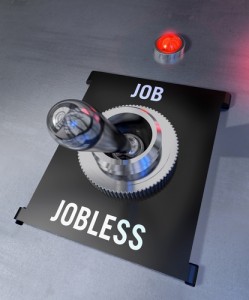 After the U.S. economy added only a disappointing 74,000 jobs in December, the worst month of job creation in three years, economists expected the U.S. Bureau of Labor Statistics on Friday to report substantial improvement in January.
After the U.S. economy added only a disappointing 74,000 jobs in December, the worst month of job creation in three years, economists expected the U.S. Bureau of Labor Statistics on Friday to report substantial improvement in January.
Well, the 113,000 jobs added last month certainly represents an improvement from December. But such job growth is far from substantial. The consensus of economists surveyed by Bloomberg ahead of Friday’s report was 180,000 jobs.
Some blamed the weak jobs number on January’s frigid weather in much of the nation.
Polar vortex or not, January marked an unhappy milestone for the nation’s jobless – exactly six years since the economy reached the peak number of jobs, as Businessweek pointed out.
Some 8.7 million jobs were lost during the so-called Great Recession of 2007-09. And in January, some four and half years after recession ended and the Obama recovery began, the U.S. was still nearly 1 million jobs shy of where it was six years ago.
What troubles are very disturbing trends at work in the labor market. That includes the 63 percent labor force participation rate in January, which is near its lowest level in 35 years.
It’s because so many working-age Americans have dropped out of the workforce that the nation’s unemployment fell to 6.6 percent in January. If the labor force participation rate had remained where it was when Mr. Obama took office, the jobless rate would be 10.5 percent.
An even more accurate picture of joblessness throughout the land is the “real” unemployment rate. The U-6, as BLS terms it, is the total percentage of unemployed and underemployed workers.
In January, the U-6 was 12.7 percent. In human terms, there were more than 20 million Americans who were either jobless, working part-time because they couldn’t find a full-time job or so discouraged they gave up looking for work.
We lament the state of the U.S. job market because we remain convinced this nation can do much better.
That’s why we second the recent suggestions by Diana Furchtgott-Roth, a senior fellow at the Manhattan Institute and former Labor Department chief economist, that the U.S. lower its corporate tax rates – the developed world’s highest – streamline regulations, which dampen job creation in industries ranging from restaurants to oil and gas, and fix Obamacare, which gives employers perverse incentive to either pare workers or reduce their hours.
Those three suggestions could create (or save) hundreds of thousands of jobs – which is more than the economy added in January.
. . . . . . . . . . . . . . . . . . . . .
This article was written by the editorial board of the Orange County Register.